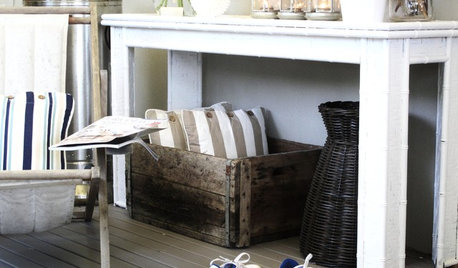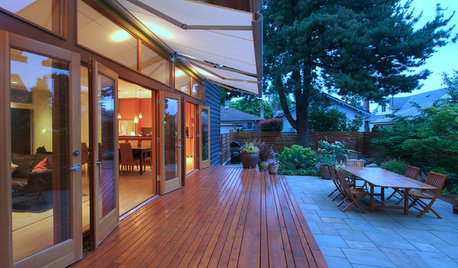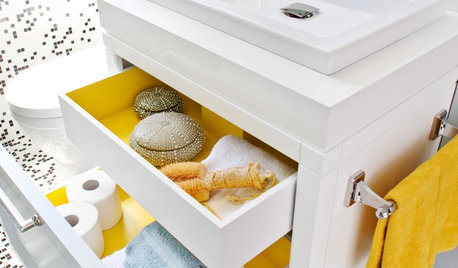shared water well
I've contracted to have a home built in new community located in Western North Carolina. My builder did not drill the water well until the home is nearing its completion. Problem is he did not find water on his first attempt. He went to the lot across from mine drilled twice and found water. He then came to me wanting to provide my water through a shared water well. I am totally against this for too many reasons to list. My contract only mentions that the builder will obtain a permit to drill a "private water well". My position is not to accept a shared well and if need be get out of the contract with hopes of getting my deposit back. Anyone have advice or a similar experience?
Comments (33)
david_cary
11 years agolast modified: 9 years agoOk - what is the huge issue with a shared well?
I guess you really need a lawyer to help you with the interpretation of "private water well". I personally think it would cover this situation. I assume the builder owns this lot. Perhaps you could get an easement for this and perhaps there could be a separate well on the same property so it isn't actually shared.
Either way, these issues are both regional and state based so you need to talk to a lawyer to see if you have any ground to stand on. But fighting to get a deposit back may not be worth the money. I assume they have the money and so you would have to fight for it. Is it really worth it?
bevangel_i_h8_h0uzz
11 years agolast modified: 9 years agoAs an attorney, I can't imagine that "private water well" would be interpreted to mean a well shared with your neighbor and on your neighbor's property...at least not in my jurisdiction.
I suspect your agreement also says something about your builder installing at least some landscaping but it probably doesn't specify that the landscaping has to be done on your property. Would that mean he could get away with installing landscaping on some other piece of property and claiming that fulfilled the terms? No way! Same situation here.
If your agreement has simply said that your builder would provide access to water sufficient for the regular daily needs of the household, then he probably could get away with hooking you up to a shared well on some other piece of property.
Tell the builder to try digging deeper or in another location.
If all else fails and you don't have any other options that the "shared well," then You need to talk to an attorney in your jurisdiction to find out your rights/obligations under a "shared water well" system. But as for problems with having a shared well, a quick google search pulled up the following:
www.in2wells.com/downloads/WellAgreements.pdf
http://boards.hgtvremodels.com/eve/forums/a/tpc/f/9981023982/m/6951082824
http://forum.horsetopia.com/boarding-farm-upkeep-real-estate/118530-shared-well-problems.html
Related Professionals
Four Corners Architects & Building Designers · Franklin Architects & Building Designers · White Oak Architects & Building Designers · Arcata Home Builders · Clearfield Home Builders · Cypress Home Builders · Immokalee Home Builders · Somersworth Home Builders · Arlington General Contractors · Bowling Green General Contractors · Chicago Ridge General Contractors · Klamath Falls General Contractors · Mount Vernon General Contractors · Valle Vista General Contractors · Waterville General Contractorsdpm1009
Original Author11 years agolast modified: 9 years agoThe contract is not anymore specific when it comes to supplying water to the home. Even though I am against a shared well I did ask that the builder provide necessary documentation that would cover the wells usage and repairs. What he sent was a JOKE! I have also asked my lender about this situation and have been told that the well and agreement must follow FHA guidelines since they are the most strick even though I am not applying for an FHA loan. I have gone back to my builder and realtor advising that the builder should proceed as if all of the lots that surround mine were ocuppied having their own wells. I would think he'd be forced to drill until he found water. I have yet to talk with anyone or find something online that has something good to say about a shared well. Heck, I'm not even in the house and look at the headaches I'm going through. I understand how the system can work what I don't want is the problems down the road with someone that might be a royal pain in the a*%. We can do without a lot, water is not one of them.
dekeoboe
11 years agolast modified: 9 years agoI feel for you on the dry hole situation, our first 600 foot well also came up dry. (At least I consider 1 quart per minute a dry well.) Anyway, we had a seasonal cabin in Maine over 20 years ago and we had a shared well. However, when we went to sell it, we had to install our own well because we could not sell without a private well due to the fact that no one would be able to get a mortgage for a cabin with a shared well. So, you might want to check with your lender as that may give you an easy out.
cat_ky
11 years agolast modified: 9 years agoMy husbands family had a shared well for many years. The other people didnt pay for any of the maintenance, or repairs, it all fell on his family. When the city ran water lines to that sub division, they had the lines run to the house, but didnt hook up to it until a few months later, when the pump went out of the well and needed to be replaced. The next door neighbors were so sure that they would keep paying to keep the well working, that they didnt bother to have the lines run to their house, so they ended up totally out of water, until they spent the money to get the well working. To me, a shared well, is like a shared driveway, and it isnt often it works out.
david_cary
11 years agolast modified: 9 years agoWell I just built with a shared septic system (different side of the coin). Modern day you have HOA agreements that dictate maintenance etc. There was no issue with getting a mortgage.
While we bought our land with the knowledge of the plan, it certainly is a different situation than the OP. But a septic system is probably 1000 times more potentially problematic than a well.
Community wells are quite common in Western NC. They are very common in central NC. As far as I can see, the primary difference between a shared well and a community well is the amount of people in the community. Now that might not be entirely true because of the mandatory testing on a community well that may not be true with a shared well.
There are advantages - even if really small. The well would have to flow for 2x the usage of one house. Usually you would be able to peak higher than that as long as the other house wasn't peaking at the same time. The same holds for a septic system.
Either way - there won't be mortgage problems. There will be a mandatory legal agreement to minimize maintenance issue.
dpm1009
Original Author11 years agolast modified: 9 years agoAs I can appreciate that there are shared wells in use with no problems I don't want to be in a situation where I have to rely on the other party to uphold an agreement that deals with water. If a dispute arises would I not be in a situation where I had to pay for restoration of water then go after the other party for their share of any sort of repair? I feel that certain disputes can be delt with over time water not being one of them.
If during contarct negotiations my builder would have discussed a shaed well I would not have signed the deal. In fact, when in the negotiation stages I asked about the difficulty in finding water on my lot his response, "water not a problem I can find water anywhere and not have to go that far to get it".
My lender is requiring the shared well agreement to follow FHA guidelines. Funny thing, my Realtor also said that there were lenders that did not require a strick agreement. Sounds like the thing to say in order to get beyond settlement and collect the commission. Again, the last thing I want to screw around with is my source of water. I feel as though the builder is forcing me to accept something I don't want.goremr
11 years agolast modified: 9 years ago"water not a problem I can find water anywhere and not have to go that far to get it".
Well, it looks as though he wasn't lying.
dpm1009
Original Author11 years agolast modified: 9 years agotrue. I just wish he was talking about my lot.
athensmomof3
11 years agolast modified: 9 years agoThere are problems with shared wells, for sure, particularly if the water flow is not high enough. We considered a shared well for irrigation but our neighbors were not interested. In hindsight, this is a good thing. We ended up only getting 22 gmp, which would have required coordinating irrigation systems so it had sufficient water for both. I can only imagine the issues that would arise if you are relying it for household water. There is also the ongoing cost of operating the well (I assume it is electric) and the issues of maintenance. Again, more issues!
As a lawyer also, I cannot imagine that a private water well would be construed to be a shared well. The solution is for him to keep drilling on your property or to get an easement for you for the well and access to the well on the neighbor's property. This may be a good solution since you won't have the ugly well but you would be able to get the water from it. Of course, this could make it very hard to sell the adjoining lot but that is not your problem ;)
I would NOT accept a shared well.
dpm1009
Original Author11 years agolast modified: 9 years agoThis morning I visited with a lawyer who advised as most that I should hold my ground on wanting my own well.
Funny thing he mentioned just as athensmomof3 to see if the builder would provide an access to the unoccuppied neighboring lot for my private well, something I'll keep in mind with possibly presenting to the builder. Who would have ever thought that building on a 3 acre parcel of land would be so hard. Just goes to show that had the builder allowed the septic and water to be set first then building the house around the two most vital parts of a house this problem probably would not exsist.arch123
11 years agolast modified: 9 years agoWe shared a well with neighbors in Colorado - they were great people and it worked out very well. I guess I would want to know what the well test was - Gallons/minuet, - legal issues etc.
I will say when we had a problem with the well or pump it was nice to half the cost.bevangel_i_h8_h0uzz
11 years agolast modified: 9 years agoHow close to your lot line is the nearest of the two places where he drilled and found water. If close enough, maybe the lot lines could be adjusted/modified so that one of the wells is on your lot and the other remains on the other lot. If a new line, maybe angled slightly from the current line, could be drawn that shifts the well and some of your neighbors property over to you and shifts a nearly equivalent amount of your property over to your neighbor, you might be able to solve the problem that way.
You'd have to look at a map and see.But if it looks like it could be done, talk with your lawyer about the process for carrying out a lot line modification in your jurisdiction before proposing the idea to your builder.
Some jurisdictions make this a relatively simple process tho of course anyone who has a lien on either piece of the land - including the bank carrying the construction loan -would have to be on board. Other jurisdictions make you jump thru about gazillion hoops to do it making it not worth even considering. But I thought I'd mention it as another possible course of action. I'm assuming you don't want out of the contract if the water well issue can be solved to your satisfaction.
dpm1009
Original Author11 years agolast modified: 9 years agoHere's the latest
My builder has know had his attorney draft a shared water well agreement that is somewhat vague. As a part of this agreement he is requesting that I sign an additional agreement that he will only drill again on my lot at a maximum of 500ft and if nothing found I would have to accept the shared well. If I wanted to opt out of the contract he is requesting that I forfeit my deposits, $25,000...ouch! At this point I would prefer to find a home somwhere else. Question is, since my contrcat is vague on the supply of water does he have the right to keep all or a portion of the deposit?bevangel_i_h8_h0uzz
11 years agolast modified: 9 years agoDo NOT sign any agreement prepared by your builder or his attorney without first having it reviewed by your own attorney!
As far as whether the builder has a right to keep all or a portion of your deposit and under what conditions, an attorney from your jurisdiction (who knows the statutes AND how courts in your state have ruled in similar disputes) would need to study your entire contract agreement before he/she would be able to give you a legal opinion. Even if you quote what you consider the relevant language on this forum, there may be other parts of the contract that help inform how that "vague" language should be interpreted.
A few general contract interpretation rules might help you:
First, where contract language is clear and explicit and doesn't lead to absurd results, courts interpret the contract based on what is written in the instrument itself. They won't pay any attention to letters/emails exchanged by the parties prior to or after the signing...but if you sign a NEW agreement, that will override the first contract. So I repeat, do NOT sign or orally agree to anything new without your own attorney's approval.
Second, the words in a contract are understood in their normal, ordinary popular sense unless the parties give them a special technical meaning or unless a special technical meaning is commonly given to the words within the particular business or profession to which the contract relates. (I don't think "private water well" has a special technical meaning in the building industry, but in your State, maybe it does.)
Third, technical terms must be interpreted as they are usually understood by persons in the business or profession to which they relate, unless the parties clearly used them in a different sense. If "private water well" is, by some chance, a technical term among the builders in your state, you need to find out how the term is interpreted by other builders in your area. Your lawyer can help you do that.
Fourth, where a contract is ambiguous, the ambiguities are resolved AGAINST the party that drafted the agreement, unless the contract specifically states that this rule is NOT to be followed. If it is not clear what "private water well means, and your builder (or his attorney) drafted the agreement but didn't put in a clause stating that this ambiguity resolution rule was not to be followed, then you win. Your attorney will know whether there is any "ambiguity interpretation" clause in the contract.
And finally, where the parties were NEVER in agreement about a material (vital) aspect of the contract, then there is no contract because there was never any "meeting of the minds." In such an event, you would get your money back minus any amount that your builder had spent that actually benefited you. If, from the get go, you understood "private water well" to mean a well on your own land that you alone own and benefit from, while by the same language your builder intended only that he would supply you with a source of water that did not involve hooking you up to a public/city water supply, then it seems to me that there was never a meeting of the minds on THIS particular issue. Whether the type and location of the water well is or is not "material" to the contract is a question that only the courts in your jurisdiction can ultimately resolve. Your attorney would have a better sense of how they are likely to rule based on prior (precedent) cases and other facts surrounding your negotiation with your builder.
However, the mere fact that your builder wants you to sign a new agreement stating that he must only drill one more time on your lot and then only to a depth of 500 feet and that if he still hits nothing, you agree to accept the shared well suggests that he KNOWS he is over a barrel and is trying to get you to let him off.
If I were you and this were happening in my State, I would probably tell the builder "NO, I do not want to opt out of the contract. I want you to meet the terms of the contract by providing me with a private water well which means a well on my property that I alone own and benefit from. And if that means you have to dig another half dozen holes or dig 1000 or 2000 feet deep before you hit reliable water on my property, well that's your problem. Our contract does not set any limit on how often or how deep you are required to dig. It only states that you will provide me with a private water well. HOWEVER, if YOU, Mr. Builder, want to opt out of our agreement, I will consider agreeing to rescind the contract in exchange for you returning my $25K deposit with interest for the time you have held it PLUS paying me an additional $XXX amount to cover the legal fees I have incurred up to this point and for the time/energy I have wasted on this project due to your inability to meet the terms to which you agreed."
Then HE could decide if he wanted to spend additional money attempting to hit water on the property or return my money to me with interest and attempt resell the property to someone else under a contract specifying a shared water well in the first place.
dpm1009
Original Author11 years agolast modified: 9 years agoWow!! Thank you bevangel!! You have lefted my spirits and caused a smile. We have been in such a nosedive over this well issue. Thank you for the advice. I've scanned my contract several times only finding one phrase dealing with water and that is that the builder will apply for a "Private Drinking Water Well" permit. You are right, I understand this to mean that I will be provided with a water well on my property solely for the usage at my home. Again, I would have never have signed this contract if I had known that the builder intended to put my home on a shared water well. My intention is to hold my ground having the builder either drill again without backing me into a corner or refunding my deposit.
Thanks again.athensmomof3
11 years agolast modified: 9 years agoI would think that the contract would have to spell out how he gets to keep your deposit. If he breaches the contract by not providing you with the contracted for private water well, then he doesn't keep your deposit. Period. Even if the contract says he can, I am sure no court would enforce that sort of provision.
You are in the right. Insist on a well or back out of the contract.
krycek1984
11 years agolast modified: 9 years agodpm, make sure you get a lawyer! I saw nothing in your most recent post about you getting a lawyer. It's a necessity! You can bet your bottom dollar he has a lawyer!
bevangel_i_h8_h0uzz
11 years agolast modified: 9 years agodpm - I'm glad my previous post made you smile b/c I suspect this one will do the exact opposite. Your most recent post indicates that the only language in your contract regarding water is that Builder will apply for a "Private Drinking Water Well" permit. If I were a sleazy lawyer representing your builder, I would argue that builder has met his contractual obligations to you as soon as he APPLIED for the permit and that nothing in the language obligates him to dig a well that meets whatever conditions your county has set up for actually GRANTING the permit.
Additionally, having noted that you are in NC, I asked my uncle who builds custom homes in eastern NC about private water wells in that state. Turns out that apparently back in around 2005 or 2006, your legislature, with the advice of the NC Groundwater Association, passed some legislation governing "private drinking water wells."
I have no idea what the exact wording of the law is but, any time a law gets passed governing just about any subject, practically the first thing in the law is a bunch of definitions of terms so everyone can know what the law applies to and what it doesn't. I would bet money that the NC legislation includes a definition of what constitutes a "private drinking water well" in your state. And it is very probable that a court would construe your agreement using the definition found in the state legislation!
By passing a law on the subject and defining it, the NC legislation basically recognizes that "private drinking water well" is a TECHNICAL term in your state and the legislative definition is presumed to track the understanding of persons in the business or profession. Instead of the term being understood in its normal everyday sense, you may be stuck with whatever definition the legislature came up with.
A NC lawyer with experience in residential construction or water well disputes would likely have already known about this legislation and any definitions incorporated within it or he would have found the legislation and definition before giving you a legal opinion.
This kind of thing is exactly why I repeatedly suggested that you take your agreement to an attorney and let him review it in its entirety before taking action. PLEASE PLEASE PLEASE, see a good lawyer.
brickeyee
11 years agolast modified: 9 years ago"Question is, since my contrcat is vague on the supply of water does he have the right to keep all or a portion of the deposit?"
Local attorney time.
Pay now or pay later.
dekeoboe
11 years agolast modified: 9 years agoI have no idea what the exact wording of the law is but, any time a law gets passed governing just about any subject, practically the first thing in the law is a bunch of definitions of terms so everyone can know what the law applies to and what it doesn't. I would bet money that the NC legislation includes a definition of what constitutes a "private drinking water well" in your state. And it is very probable that a court would construe your agreement using the definition found in the state legislation!
Probably this definition:
"Private drinking water well" means any excavation that is cored, bored, drilled, jetted, dug, or otherwise constructed to obtain groundwater for human consumption and that serves or is proposed to serve 14 or fewer service connections or that serves or is proposed to serve 24 or fewer individuals. The term "private drinking water well" includes a well that supplies drinking water to a transient noncommunity water system as defined in 40 Code of Federal Regulations � 141.2 (July 1, 2003 Edition).
Here is a link that might be useful: NC General Statues
dpm1009
Original Author11 years agolast modified: 9 years agoThanks to all for providing your great advice.
I would think that the builder has been advised by his lawyer to make every step to get me to sign a shared well agreement as well as the conditions for him to drill again. Otherwise he would not have stopped installing the shared system, all components in place up to crossing under the street with water lines that would feed my house. Again the contract is vague on addressing water to the house, something I now wish I had addressed. I would have never signed this deal if it even mentioned a shared well system.
The builder's attorney has sent me documents for review. My Realtor has said that the attorney handling settlement would review these docs with me prior to settlement and to resolve this shared well agreement. This seems odd since the Realtor was the one who put this attorney's name in the contract as a settlement attorney. My position is to meet with this attorney sign nothing and asked what relationship this attorney has with either my realtor and or builder. If there is any connection with either I walk out! I can't believe what a mess this has turned into. We have moved here from a state away, established a business, our sense of excitement has gone from euphoria to rock bottom. Heck while we're at rock bottom I guess we'll look for water.bevangel_i_h8_h0uzz
11 years agolast modified: 9 years agoPlease understand that the attorney handling the settlement (aka "closing") does NOT represent you. He or she is supposed to be a neutral party whose only job is to see to it that all documents are properly filled out and signed and recorded in county records.
Even if the settlement attorney has no relationship with your realtor or with your builder, and even though you pay him through one of the many fees listed on the closing documents, he does not represent you. It is NOT tbe settlement attorney's job to make sure that any agreement you enter into won't turn around bite you in the a55 someday! It is his job to remain NEUTRAL and, while he should answer any questions you (or the builder) ask honestly, remaining neutral includes NOT volunteering an opinion or information that might tell you (or the builder) that an agreement you are considering signing could/would be to your disadvantage.
To make this clear... if you were from a foreign country, barely spoke English, and didn't have a clue about the value of a dollar, and some sleaze ball got you to agree to pay a million dollars for a half-acre of totally unbuildable/unuseable land bordering a hog slaughtering facility on one side and a major freeway on the other, the closing attorney's NEUTRALITY obligations would probably preclude him from even suggesting to you that this might be a bad deal. About the most he could ethically do would be to ask you if the documents accurately described the agreement you want to enter into and whether you had had them reviewed by an attorney who represents your interests.
I can't say this strongly enough, HIRE YOUR OWN ATTORNEY!
Sorry for shouting but...
User
11 years agolast modified: 9 years agoA private water well is one not owned and maintained by any municipality. It can be a private co-op set up to serve a planned community, or it can be an even smaller community well that only serves 2-3 homes. Either way, it's privately maintained and not part of the municipal water system.
Your builder has pretty much satisfied the requirement that he provide you with a private well, even if you don't like how he's done that by having it be a private shared well. You NEED your own lawyer to represent your interests here, because I can most definitely see you forfeiting your whole deposit if you walk over this issue. In the end, many many people live with such a system providing water for their homes, and they do so successfully because of the legal agreements governing it's maintenance and repair that make all parties responsible. Be sure that your own lawyer is the one who drafts that agreement rather than allowing a builder to foist one onto you.
david_cary
11 years agolast modified: 9 years agoMy advice would be to skip the attorney. Why? - because you have no case. It sounds like the definition of a private well is pretty clear and he has met that requirement.
I know you don't like it, but like I said earlier it is a pretty common arrangement.
Think of it this way - the road you are driving on to get to your house is "shared" and you have to rely on government or other legally obligated body to maintain the road.
Water is plentiful in NC for the most part. You could put in cisterns as security....
auroraborelis
11 years agolast modified: 9 years agoMy lot has a shared will between about a dozen homes. The well is actually on my lot, and the water is pumped up to a largestorage tank at the top of the hill (my lot is one of the few flat ones, most are hillside). The only problem is actually too much water pressure! :)
It was set up this way years ago a previous owner of my property who set up the easement as all of the homes on the hill would not have been able to get water otherwise.
It is run under similar rules as an HOA, and governed by similar laws. There was once a case where a member refused to pay, and it was argeement was easily held up in court.
I don't think that it is necessarily an awful arrangement, and as long as there is a strict agreement in place, and enough waterflow then it can work well, and save you money.
krycek1984
11 years agolast modified: 9 years agoWhat doesn't the OP get about "hire a lawyer"?
Why would you go meet with an attorney without your own attorney with you? That's asking for trouble.
david_cary
11 years agolast modified: 9 years agobevangel - much of western NC is served by shared driveways and non public roads. My only point is that all things are shared in the end. If you trust the government to maintain the road, you probably should trust the government to maintain the legal agreement that keeps the water flowing.
And a road problem can actually be worse than a water problem. If a rockslide covers the road and it is impassable, that is a bigger problem than buying jugs of water. And perhaps a far more expensive problem. Imagine a community that has gone bankrupt and now has an impassable private/shared road. This is the mountains (most likely as Western NC is all mountains)
Maybe saying that I wouldn't hire a lawyer was not the best advice. I was just trying to temper the OPs expectations as I really think (non lawyer opinion) that he doesn't have a case. The definition in recent statute is very clear and these arrangements are fairly common in the region. Do you honestly expect there is a clause in the (presumably builder's) contract that will give the OP some recourse?
Perhaps he will meet with a lawyer who needs the money. Takes $5000 of his money to fight what is really a deposit issue and he loses. Then all the "hire an attorney" advice may be bad advice. Sure - talk with an attorney but hiring an attorney is certainly not a guaranteed victory. Perhaps the best thing to do is forfeit the deposit.
The OP is soured on the build - presumably for multiple reasons. This is probably the straw. If everyone cheers - "get a lawyer" - it may end up costing him more in the end. He is pissed and making an emotional decision may not be best in the end.
My partner had a contractor just stop working on a renovation. He spent $10,000 to sue the contractor and won. Now all he has to show for it is $10,000 less in his bank account. He got emotional, hired a lawyer and lost.
dpm1009
Original Author11 years agolast modified: 9 years agodavid-cary, I appreciate your input and advice. My situation deals with water not a road maintained by the government or a raod within a private community. I would think that if I was dealing with a road issue within a private community that either neighbors would or could ban together to solve the issue or the HOA would have money in reserve to fix the problem. If my neighbor does any number of things to prevent water getting to my home I'm screwed.
I understand that you do not think I have a case. It seems that the builder and his attorney might think I do have a case since he stopped installing a shared water system once I started using the term "contract". Further he has taken steps that he would only drill again on my lot if I sign an agreement that he would drill again only to 500ft and if nothing found I would either be forced to accept the shared well or walk and forfeit my deposit money. Now this certainly sounds that he, the builder, is now attempting to either change the contract or have me enter into a new contract. My position is that if all the houses around mine were occupied and on their own wells what options would he have but to drill until he found water on my lot. The biggest problem with this well/build is that the builder was in such a hurry and trying to save on excavation cost that he started building the house before he had the septic and well in place, seems a backwards way of building a home. My lot is 3 acres - he handcuffed the well location by building the home first.
One last analogy: you buy a car and during the negotiations you find that someone else is also interested in the same car, only one of these models were made by the manufacturer. You sign the deal for purchase being overcome with joy. You then go to the titling department and are told that you will be required to share the car with the other party.
Same situation for me my home is one-of-a-kind, when I signed the deal the builder told me that finding water was the least of his concerns, "I can find water anywhere".
I would think that this coming week I'll have solutions and direction.live_wire_oak
11 years agolast modified: 9 years agoThe suggestion to get your own lawyer is an excellent one. You need your legal position clarified so that you understand what your next move could be. From years of being accepted as standard practice and the precise terminology, I think the next step would be the lawyer drafting up the shared use agreement for the well. Or else saying goodbye to the the deposit.
Your car analogy isn't correct. It's more like you purchased a pie shaped lot with very little street frontage. You are assured by the builder that you can have your own private driveway, but after you purchase the lot, you find out that to have your own driveway, the other lot has to give you an easement. Since the builder owns the other lot, that's easily accomplished. It doesn't affect your usage of your property a bit. Whom it affects is the potential other lot holder who will now have to buy an encumbered lot. It's the same here. The potential other owner of the lot may be the one who has a problem with a shared well, but since he's second in line, that's a make or break deal for him, not for you.
I bought a home that had had a shared community well for 30 years. My grandparents lived in a shared well community for 60 years, with one well replacement and no one welshed out on their responsibility. Problems with shared wells are not a common scenario in communities where everyone relies on everyone else for the common good.
Take a deep breath and calm down city boy. :). I understand you wanting to be cautious here about shared responsibilities, but this is a VERY common rural scenario that you are blowing out of proportion and that you are risking losing a big chunk of money over. A shared well that produces enough water for all and that is maintained by agreement isn't an issue to get bent out of shape about at all.
bevangel_i_h8_h0uzz
11 years agolast modified: 9 years agoI think we've probably just about beat this horse to death.
OP has seen opinions from all sides... all of which are helpful because they certainly illustrate all the different ways that a person - including a judge or juryman - might look at the water well issue, as well as the pros/cons of hiring an attorney. I think at this point, OP has to decide how he wants to proceed while the rest of us attempt to send good karma his way for a speedy and positive resolution!
To everyone who chimed in, I would personally like to say that this kind of discussion, carried out civilly and focused on attempting to help OP find a solution to his problem, is one of the reasons I am so hooked on this forum! :-)
OP, I do hope you'll keep us posted on what decisions you wind up making AND how it all turns out for you. That way, we all learn together and the next time someone posts with a similar question, we'll have first-hand (well, almost first-hand) experience to share.
david_cary
11 years agolast modified: 9 years agoAgreed - good discussion.
Having just built with a septic system, it was installed last. The fear is that some sub will drive over an area that they shouldn't. We are on a small lot so it was a real concern but either way, it can be an issue. I imagine a well is a similar concern although much less of an area to be concerned about.
Either way, it was absolutely normal to do the septic last.



















bevangel_i_h8_h0uzz